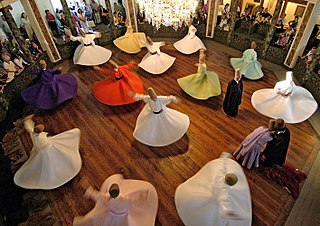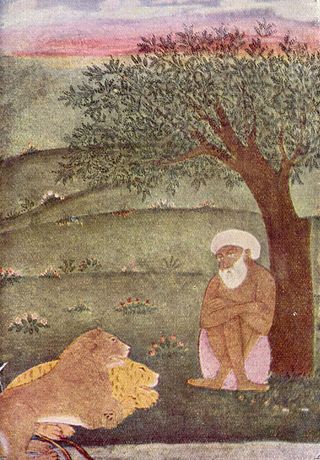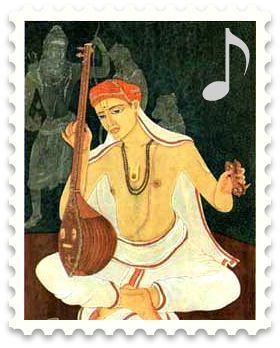
Jalāl al-Dīn Muḥammad Rūmī, or simply Rumi, was a 13th-century poet, Hanafi faqih (jurist), Islamic scholar, Maturidi theologian (mutakallim), and Sufi mystic originally from Greater Khorasan in Greater Iran.

The Mevlevi Order or Mawlawiyya is a Sufi order that originated in Konya, Turkey and which was founded by the followers of Jalaluddin Muhammad Balkhi Rumi, a 13th-century Persian poet, Sufi mystic, and theologian. The Mevlevis are also known as the "whirling dervishes" due to their famous practice of whirling while performing dhikr. Dervish is a common term for an initiate of the Sufi path; whirling is part of the formal sema ceremony and the participants are properly known as semazens.

The Chishti order is a Sufi order of Sunni Islam named after the town of Chisht where it was initiated by Abu Ishaq Shami. The order was brought to South Asia by Mu'in al-Din Chishti in the city of Ajmer.

Sama is a Sufi ceremony performed as part of the meditation and prayer practice dhikr. Sama means "listening", while dhikr means "remembrance". These performances often include singing, playing instruments, dancing, recitation of poetry and prayers, wearing symbolic attire, and other rituals. Sama is a particularly popular form of worship in Sufism.
The Music of Pakistan includes diverse elements ranging from music from various parts of South Asia as well as Central Asian, Middle Eastern, and modern-day Western popular music influences. With these multiple influences, a distinctive Pakistani music has emerged.

Dervish, Darvesh, or Darwīsh in Islam can refer broadly to members of a Sufi fraternity (tariqah), or more narrowly to a religious mendicant, who chose or accepted material poverty. The latter usage is found particularly in Persian and Turkish (derviş) as well as in Tamazight (Aderwic), corresponding to the Arabic term faqīr. Their focus is on the universal values of love and service, deserting the illusions of ego (nafs) to reach God. In most Sufi orders, a dervish is known to practice dhikr through physical exertions or religious practices to attain the ecstatic trance to reach God. Their most popular practice is Sama, which is associated with the 13th-century mystic Rumi. In folklore and with adherents of Sufism, dervishes are often credited with the ability to perform miracles and ascribed supernatural powers. Historically, the term Dervish has also been used more loosely, as the designation of various Islamic political movements or military entities.

Qawwali is a form of Sufi Islamic devotional singing originating in South Asia. Originally performed at Sufi shrines or dargahs throughout South Asia, it is famous throughout Pakistan, India, Bangladesh and Afghanistan and has also gained mainstream popularity and an international audience as of the late 20th century.

Sufi whirling is a form of physically active meditation which originated among certain Sufi groups, and which is still practiced by the Sufi Dervishes of the Mevlevi order and other orders such as the Rifa'i-Marufi. It is a customary meditation practice performed within the sema, or worship ceremony, through which dervishes aim to reach greater connection with Allah. This is sought through abandoning one's nafs, ego or personal desires, by listening to the music, focusing on God, and spinning one's body in repetitive circles, which has been seen as a symbolic imitation of planets in the Solar System orbiting the Sun.

Sayyid Abdullah Shah Qadri, known popularly as Baba Bulleh Shah and Bulleya, was a 17th and 18th-century Punjabi revolutionary philosopher, reformer and a Chishti Sufi poet, universally regarded as the "Father of Punjabi Enlightenment". He spoke against powerful religious, political and social institutions.

Islamic music may refer to religious music, as performed in Islamic public services or private devotions, or more generally to musical traditions of the Muslim world. The heartland of Islam is the Middle East, North Africa, the Horn of Africa, Balkans, and West Africa, Iran, Central Asia, and South Asia. Due to Islam being a multi-ethnic religion, the musical expression of its adherents is vastly diverse. Indigenous traditions of various part have influenced the musical styles popular among Muslims today. The word "music" in Arabic, the language of Islam, is defined more narrowly than in English or some other languages, and "its concept" was at least originally "reserved for secular art music; separate names and concepts belonged to folk songs and to religious chants".
Sufi rock or Sufi folk rock is a subgenre of rock music that combines rock with classical Islamic Sufi music traditions. It emerged in the early 1990s and became widely popular in the late 1990s in Pakistan and Turkey. The term "Sufi rock" was coined in 1993 by writer Nadeem F. Paracha to define the Pakistani band Junoon, who pioneered the process of fusing conventional rock music with folk Sufi music and imagery.
A list of topics related to the topic of Sufism.

Kafi is a classical form of Sufi music in the Punjabi and Sindhi languages that originated from the Punjab and Sindh regions of South Asia. Some well-known Kafi poets are Baba Farid, Bulleh Shah, Shah Hussain, Shah Abdul Latif Bhittai, Sachal Sarmast and Khwaja Ghulam Farid. This poetry style has also lent itself to the Kafi genre of singing, popular throughout South Asia, especially Pakistan, Bangladesh and India. Over the years, both Kafi poetry and its rendition have experienced rapid growth phases as various poets and vocalists added their own influences to the form, creating a rich and varied poetic form, yet through it all it remained centered on the dialogue between the Soul and the Creator, symbolized by the murid (disciple) and his Murshid (Master), and often by lover and his Beloved.

Sufi literature consists of works in various languages that express and advocate the ideas of Sufism.

Sufism has a history in India evolving for over 1,000 years. The presence of Sufism has been a leading entity increasing the reaches of Islam throughout South Asia. Following the entrance of Islam in the early 8th century, Sufi mystic traditions became more visible during the 10th and 11th centuries of the Delhi Sultanate and after it to the rest of India. A conglomeration of four chronologically separate dynasties, the early Delhi Sultanate consisted of rulers from Turkic and Afghan lands. This Persian influence flooded South Asia with Islam, Sufi thought, syncretic values, literature, education, and entertainment that has created an enduring impact on the presence of Islam in India today. Sufi preachers, merchants and missionaries also settled in coastal Gujarat through maritime voyages and trade.

Tabeer is the debut solo studio album by Pakistani classical and pop singer, songwriter, and composer Shafqat Amanat Ali, released in India on September 9, 2008 by the Music Today label.
Sufism in Sindh covers the tradition of Sufism in Sindh, which is reputed to be an area of mystics. Sindh is famous for the enormous number of saints and mystics who lived there and preached peace and brotherhood. According to popular legend, 125,000 of them are buried on Makli Hill near Thatta. There is an abundance of Sufi literature produced in Sindh throughout history.

Sufism in Bangladesh is more or less similar to that in the whole Indian subcontinent. India, it is claimed, is one of the five great centers of Sufism, the other four being Persia, Baghdad, Syria, and North Africa. Sufi saints flourished in Hindustan (India) preaching the mystic teachings of Sufism that easily reached the common people, especially the spiritual truth seekers in India. Sufism in Bangladesh is also called pirism, after the pirs or teachers in the Sufi tradition.

Dhruv Sangari also known as Bilal Chishty Sangari بلال ڇݜتى سنگارى is a Sufi and Classical Indian vocalist, composer, lyricist, savant and teacher. He is the son of well-known scholar and author Kumkum Sangari and noted painter Mahendra 'Manu' Sangari.

Saira Peter MSc MA (Lon) is a British-Pakistani soprano officially recognised as the world's first Sufi Opera singer. She is Director of NJ Arts London, a multicultural performing arts centre opened in 1998 by Sir Cliff Richard OBE. She is also founder of Saira Arts Academy (SAA) which was officially inaugurated in Lahore by Fed. Min. for National Heritage and Culture, Syed Jamal Shah, who lauded it as 'heralding a new era in the country’s music industry.'














